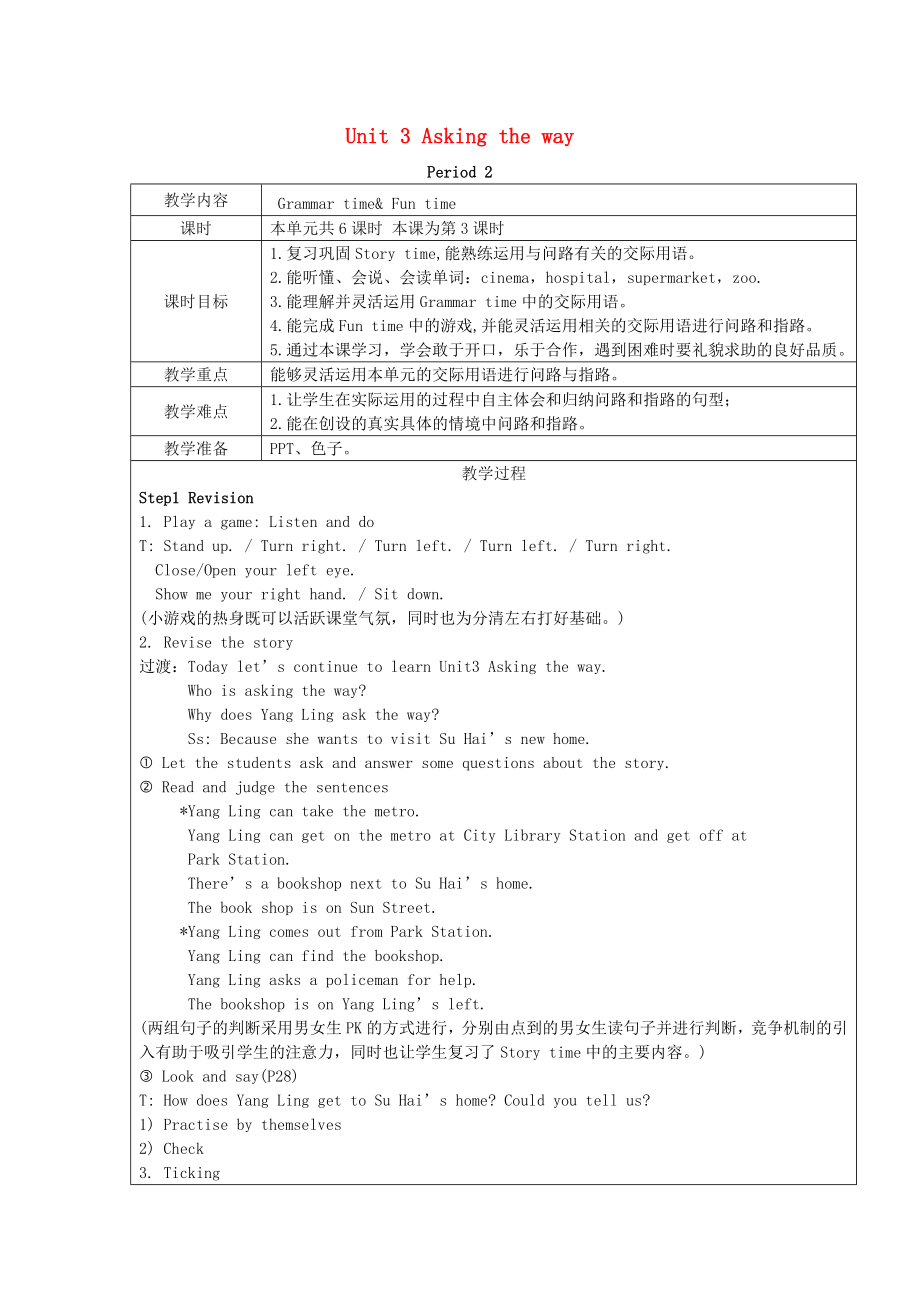《2022春五年級(jí)英語(yǔ)下冊(cè) Unit 3 Asking the way Period 2教學(xué)設(shè)計(jì) (新版)牛津版》由會(huì)員分享���,可在線閱讀�,更多相關(guān)《2022春五年級(jí)英語(yǔ)下冊(cè) Unit 3 Asking the way Period 2教學(xué)設(shè)計(jì) (新版)牛津版(3頁(yè)珍藏版)》請(qǐng)?jiān)谘b配圖網(wǎng)上搜索�����。
1、Unit 3 Asking the way
Period 2
教學(xué)內(nèi)容
Grammar time& Fun time
課時(shí)
本單元共6課時(shí) 本課為第3課時(shí)
課時(shí)目標(biāo)
1.復(fù)習(xí)鞏固Story time,能熟練運(yùn)用與問(wèn)路有關(guān)的交際用語(yǔ)�����。
2.能聽懂�����、會(huì)說(shuō)�、會(huì)讀單詞:cinema,hospital�����,supermarket���,zoo.
3.能理解并靈活運(yùn)用Grammar time中的交際用語(yǔ)�����。
4.能完成Fun time中的游戲,并能靈活運(yùn)用相關(guān)的交際用語(yǔ)進(jìn)行問(wèn)路和指路。
5.通過(guò)本課學(xué)習(xí)���,學(xué)會(huì)敢于開口�,樂(lè)于合作,遇到困難時(shí)要禮貌求助的良好品質(zhì)�。
教學(xué)重點(diǎn)
能夠靈活運(yùn)用本單
2、元的交際用語(yǔ)進(jìn)行問(wèn)路與指路���。
教學(xué)難點(diǎn)
1.讓學(xué)生在實(shí)際運(yùn)用的過(guò)程中自主體會(huì)和歸納問(wèn)路和指路的句型�;
2.能在創(chuàng)設(shè)的真實(shí)具體的情境中問(wèn)路和指路�。
教學(xué)準(zhǔn)備
PPT、色子��。
教學(xué)過(guò)程
Step1 Revision
1. Play a game: Listen and do
T: Stand up. / Turn right. / Turn left. / Turn left. / Turn right.
Close/Open your left eye.
Show me your right hand. / Sit down.
(小游戲的熱身既可以活躍課堂氣氛�,
3、同時(shí)也為分清左右打好基礎(chǔ)�����。)
2. Revise the story
過(guò)渡:Today let’s continue to learn Unit3 Asking the way.
Who is asking the way?
Why does Yang Ling ask the way?
Ss: Because she wants to visit Su Hai’s new home.
? Let the students ask and answer some questions about the story.
? Read and ju
4��、dge the sentences
*Yang Ling can take the metro.
Yang Ling can get on the metro at City Library Station and get off at
Park Station.
There’s a bookshop next to Su Hai’s home.
The book shop is on Sun Street.
*Yang Ling comes out from Park Station.
Yang Ling can find the bookshop.
Yang L
5��、ing asks a policeman for help.
The bookshop is on Yang Ling’s left.
(兩組句子的判斷采用男女生PK的方式進(jìn)行�,分別由點(diǎn)到的男女生讀句子并進(jìn)行判斷,競(jìng)爭(zhēng)機(jī)制的引入有助于吸引學(xué)生的注意力��,同時(shí)也讓學(xué)生復(fù)習(xí)了Story time中的主要內(nèi)容。)
? Look and say(P28)
T: How does Yang Ling get to Su Hai’s home? Could you tell us?
1) Practise by themselves
2) Check
3. Ticking
S
6����、tep2 Fun time
過(guò)渡:When Yang Ling gets to Su Hai’s home, what do they do?
Ss: (進(jìn)行各種猜測(cè)。)
T: They also play a game about asking the way.
1. Show the map and talk about it.
T: What can you see on the map?
Learn the words:cinema,hospital,zoo,supermarket
2. Show how to play the game.
?Listen
7����、to their conversation
(將地圖上的地點(diǎn)用ABCDEF來(lái)代替,兩人玩扔色子的游戲���。)
*SH:Look,E! Excuse me, how do I get to the bookshop?
YL:It’s near. You can walk there. Go along Mango Street.
The bookshop is on your right.
SH:You’re right. A star for you.
*YL:Look,A! Excuse m
8����、e, where’s the zoo?
SH:Oh, it’s very far. Go along Mango Street. Turn right at Banana
Street. Then, go along Banana Street. The zoo is on your right.
YL:Sorry, you’re wrong. You can’t get a star.
?T: Boys and girls, any other way to get to the zoo?
(讓學(xué)生嘗試用另一種路線進(jìn)行描
9�、述,并拓展:All roads lead to Rome.)
3. Play the game in pairs
(每人輪流扔3次色子��,指路正確的學(xué)生能得到一顆星��,看誰(shuí)得到的星星多���。)
1) Play in pairs
2) Check one group
4. Ticking
Step3 Grammar time
1. 總結(jié)并拓展與問(wèn)路和指路相關(guān)的交際用語(yǔ)�����。
?T: Just now, we played a funny game. If you want to go to the cinema, how do we
ask the way?
Ss:
10���、How do I get to the cinema? / Where’s the cinema?/...
(師根據(jù)學(xué)生的回答在黑板上貼上相應(yīng)的句子后補(bǔ)充并帶讀:Can you show me the way to...?)
T: When we ask the way, we should be polite. So we should say “Excuse me.” first.
?T: How to show the way near/far?
(根據(jù)學(xué)生的回答在黑板上貼上相應(yīng)的句子,同時(shí)拓展:It’s near. You can walk there. / It’s f
11����、ar. You can take the metro/bus/...)
(指路的句子有點(diǎn)多,感覺有點(diǎn)凌亂��。老師可以根據(jù)遠(yuǎn)和近來(lái)幫助學(xué)生進(jìn)行梳理�����,使之更具條理化���。)
2.T: So these expressions are very useful.
(讓學(xué)生看板書齊讀句子���。)
3.呈現(xiàn)tip
T: If foreigners ask you the way in English, can you show them the way? This unit
provides an example for you. But the expressions are more than t
12、hese. You can searchmore after class.
Step4 Consolidation
1. 出示P28路線圖�����,如果你是楊玲���,請(qǐng)告訴蘇海自己回家的路線���。
T: It’s late. Yang Ling must go home. If you were Yang Ling, do you know the way to your home now?
1)Discuss in pairs
2)Check
2. Ticking
Step5 Homework
1. Play the game with your friends or parents after class.
2. Try to collect more expressions about asking and showing the way.
當(dāng)堂練習(xí)
Workbook Period 2
板書設(shè)計(jì)
教后反思
與重建
 2022春五年級(jí)英語(yǔ)下冊(cè) Unit 3 Asking the way Period 2教學(xué)設(shè)計(jì) (新版)牛津版
2022春五年級(jí)英語(yǔ)下冊(cè) Unit 3 Asking the way Period 2教學(xué)設(shè)計(jì) (新版)牛津版

